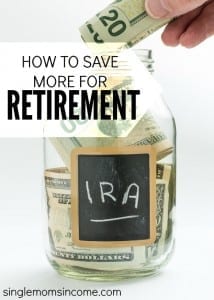 Saving for retirement is something I feel a lot of people would like to do but don’t feel they have the means to do it.
Saving for retirement is something I feel a lot of people would like to do but don’t feel they have the means to do it.
The benefits of saving for retirement including financial freedom and letting compound interest grow are great motivators but if someone feels they don’t have enough money to set aside for the investment, they will probably just put it off.
Wanting to Invest, But Not Having the Means
This was the position I was in until recently. Saving for retirement has always been one of my financial goals but I never had an employer that offered retirement benefits and I had a hard time trying to balance living for now and preparing for the future.
As a mom, my primary goal is to provide for my child and meet his needs and cover his expenses. Then there’s my debt that needed to be taken care of before the interest got out of control. I also have goals to save and build my emergency fund so I don’t sink deeper into debt if any unexpected expenses pop up (as they always do). Given all these expenses, investing was still a priority but it was pretty low on the list and I felt like my budget was tight enough already.
Thankfully, I did manage to open a Roth IRA through Betterment this year, but I know there are many other people who are struggling to stretch their budget to fund retirement contributions. According to CNN Money, at least 75% of Americans live paycheck to paycheck with little to no emergency savings and last year CBS News indicated that 69% of 18 to 29-year-olds and a third of 30-49-year-olds have yet to start putting anything aside for retirement.
Putting off retirement investing is a big mistake that could keep you working for longer that you planned. If you want to invest in your retirement but feel you can’t afford the expense right now, here are four ways to help stretch your budget to make it possible.
1. Trim the Fat
When you create a realistic budget, it’s common to overcompensate a bit or give yourself some extra breathing room by creating a cash buffer. If you aren’t investing though, you’ll need to trim the fat from your budget even more which can eliminate that cash buffer but it’s worth it.
My advice to people who say they’ve already reduced their expenses and trimmed the fat from their budget is: Do it again! How sure are you that you can’t spare any more money?
If you still have cable can you downgrade to a cheaper package? Is your insurance rate and coverage really the best there is? Do you really need that iPhone along with that pricey bill? Instead of dining out three times every week can you adjust to only once a week? Asking yourself how you can stretch your budget can easily free up $15 dollars here, $20 there and so on, allowing you to gather up funds to put toward investing each month.
2. Don’t Go for the Employer Match if You Can’t
If your employer offers a 401(k) with a match program you should definitely take advantage of it. If you contribute enough throughout the year to get the full match that’s basically like earning free money.
However, if you can’t afford to withhold enough to get the match, don’t get discouraged. Receiving an employer match and maxing out your retirement are great accomplishments. If you can’t do these things just yet, remember that contributing something is always better than nothing. Even if you only contribute 2% or 3% of your annual salary to your 401(k), it still counts and you’d be off to a decent start. You don’t have to max out every year (I sure don’t yet) and you can always try to slowly increase your contributions every year.
3. Pay Yourself First and Deduct from Savings Categories
 Paying yourself first is the best way to ensure your financial goals are met. Treat your retirement fund like a bill that you have to pay before you count any leftover money for leisure and entertainment.
Paying yourself first is the best way to ensure your financial goals are met. Treat your retirement fund like a bill that you have to pay before you count any leftover money for leisure and entertainment.
You could also deduct from pre-existing savings categories to help round up money for retirement. For example, I save around $250/month to deposit into my emergency fund. If I cut my EF savings down to $200/month, that would give me $50 to deposit into a retirement fund. If I trim another $50 from my non-savings budget, that gives me a total $100 to use to invest.
There are quite a few ETF and mutual fund options that you can start using by only contributing $100/month. While something is certainly better than nothing, more is always better. So if you’d like to contribute more than that, keep reading.
4. Find a Side Job
Increasing your income is one of the best ways to stretch your budget and increase your retirement contributions. So if you’re able to, pick up a side hustle or get an extra side job. If you have a special skill, start freelancing and selling your services or products. Alexa shares several ways to earn extra income online and by working at home.
You can also pick up a laid back part-time job and only work once a week. I’d recommend something like product demonstrating because it’s an easy weekend job that pays a lot better than minimum wage and it typically doesn’t require you to have any special training or certifications.
When you establish a side hustle or side job the key is to dedicate all your earnings to retirement. See if you can have your employer or boss withhold your income for retirement or when a client pays you, have them deposit it into your retirement fund.
Do you save for retirement? How did you get started and fit the expense into your budget?



i treat my roth right now as my emergency fund. I have credit cards for most emergencies that i have but would not want to use. I also use right now my Roth ira as a backup for an emergency savings. I haven’t had to use it as of yet thankfully and hopefully i won’t but for now it works so i can save and make interest…
That’s great that you have a Roth IRA but I would try to avoid withdrawing from it. Saving up extra cash to use as an emergency fund could act as a great cash buffer when unexpected expenses come up.
Unfortunately, i either can save for a roth or save for an emergency fund.
Love the idea of a side job that’s only once a week that could be saved for retirement. That’s easy to wrap your head around and would make such a huge impact later in life!
I started with 3% of my income going into my 401k and graduated to 5% (with a 5% match) and now have added $100/month to a ROTH IRA. Along with my emergency fund, I know that if I ever really needed it, my ROTH is there as a worst case scenario. Every year that I receive a raise, I just adjust my contributions to “eat up” the raise so I don’t see it in my paycheck. I’m not quite maxing out my annual 401 contributions, but should be close in the next year or two. After that I want to max out my ROTH contributions.
Sounds like you have a great plan. It’s a perfect example of starting with something and increasing your contributions as you go. Good luck on making out your retirement in the future!
When I was younger, poor and a single mom I asked my dad about retirement savings. He said, “Don’t worry about it by the time you retire you’ll have enough money.” I am glad I didn’t listen. I started putting a really small amount into RRSP (Canadian) and it just became part of my financial landscape. My budget always included a bit. Now 13 years later it has grown. I have been paying into a pension program at work for 6 years now (they match, plus a bit). I may not retire rich but I will be able to take care of myself because I ignored advice, given with love but given in ignorance. Dad meant well but the world is a different place than when he was working. Thanks for the article.
That’s awesome! I’m glad you ignored that advice and started saving when you did. Now you’ll be able to retire comfortably.
That’s really great!!!! Retirement planning must be done from an early stage to prevent the future hindrances for you. planning for retirement can be easily done if one is interested from very beginning. You can also use retirement calculator to calculate the retirement income and investment. http://blog.pramfinancial.com/?s=retirement
I agree. Thanks for the comment!
My dad always used to tell me,”Retirement is wonderful,..It’s doing nothing without worrying and about getting caught at it”..He was always a wise man.He didn’t do anything after retirement but he always made provisions before when he was working.This post reminded me of my dad.Thanks alot for the great post !!
Sounds like you dad has some great advice. Glad you enjoyed the post!